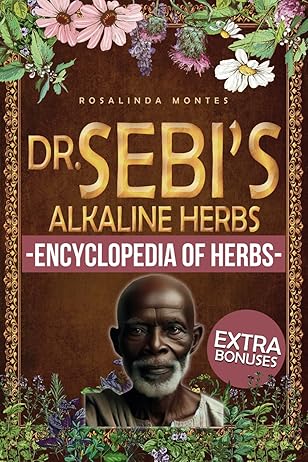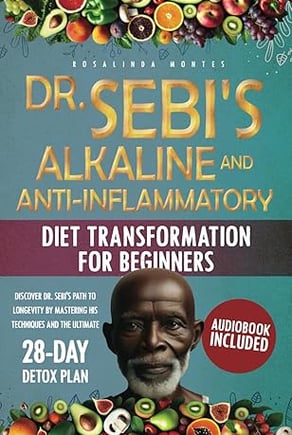Exploring Dr. Sebi's Inflammatory Suggestions and the Benefits of Sea Moss
Introduction to Dr. Sebi's Philosophy
Dr. Sebi, born Alfredo Darrington Bowman, is renowned for his holistic health philosophy, primarily focusing on the benefits of natural remedies and plant-based nutrition. With roots in traditional African and indigenous healing practices, Dr. Sebi's approach diverges significantly from conventional medicinal methods, emphasizing the importance of maintaining an alkaline diet to achieve optimal health.
Dr. Sebi's philosophy centers on the idea that many of the health issues faced by individuals today stem from an excess of mucus and inflammation within the body. He believed that by consuming certain plant-based foods and avoiding others, one could reduce inflammation, detoxify the body, and restore biochemical balance. His dietary recommendations advocate for the consumption of organic, alkaline vegetables, fruits, nuts, and herbs while discouraging the intake of processed, acidic, and hybrid foods.
One of the foundational principles of Dr. Sebi's teachings is the idea that an alkaline environment within the body can promote healing and prevent disease. He advocated that pathogens, including bacteria and viruses, thrive in an acidic environment. By transitioning to an alkaline diet, individuals can reduce the risk of infections and other health complications, making it easier for the body to heal itself naturally.
Moreover, Dr. Sebi's regimen is about what to eat and how to live holistically. His approach encourages the use of plant-based remedies and natural herbs to cleanse and nourish the body. Detoxification is a significant aspect of his philosophy, often advising the use of herbs like burdock root, bladderwrack, and sea moss, which are believed to possess numerous health benefits.
In summary, Dr. Sebi's holistic philosophy promotes a lifestyle that prioritizes natural and plant-based nutrition to combat inflammation and maintain an alkaline body environment. Through this approach, he challenged mainstream medicinal practices, advocating for a return to natural, ancestral wisdom to achieve overall well-being.
Understanding Inflammation and Its Health Impacts
Inflammation is a crucial defense mechanism of the body's immune system, pinpointing and eliminating harmful stimuli such as pathogens, damaged cells, and irritants. It is typically categorized into two types: acute and chronic inflammation. Acute inflammation is the body's immediate and short-term response to tissue injury, showcasing classic signs including redness, heat, swelling, pain, and loss of function. This type of inflammation often encourages healing and restoration of the injured area.
Conversely, chronic inflammation persists over a longer period and can occur even when there is no apparent injury or threat. Poor diet, elevated stress levels, lack of physical activity, and prolonged exposure to environmental toxins are common catalysts for chronic inflammation. This sustained inflammatory state can detrimentally affect the body, leading to a sequela of health conditions.
Some of the most prevalent health conditions associated with chronic inflammation include cardiovascular diseases, diabetes, arthritis, and certain cancers. Inflammation also plays a significant role in neurological disorders such as Alzheimer's disease and depression. Recognizing and addressing chronic inflammation is essential for maintaining overall wellness and preventing these potentially debilitating conditions.
Dietary habits contribute significantly to the occurrence and persistence of inflammation. Consuming processed foods, refined sugars, and trans fats can exacerbate inflammatory pathways, whereas a diet rich in anti-inflammatory foods like fruits, vegetables, whole grains, and healthy fats can mitigate these effects. Furthermore, stress management practices, regular physical exercise, and minimizing exposure to environmental toxins are pivotal in reducing chronic inflammation and enhancing the body's resilience.
As we explore the benefits of natural remedies like sea moss in subsequent sections, acknowledging the underlying role of inflammation in health and disease helps us appreciate the importance of mitigating its harmful effects. Embracing a proactive approach to managing inflammation can lead to substantial improvements in health and quality of life.
Dr. Sebi's Inflammatory Suggestions
Dr. Sebi, renowned for his advocacy of a plant-based diet, offers a series of dietary suggestions aimed at reducing inflammation. Central to his philosophy is the elimination of foods he believes contribute to inflammation, including processed foods, dairy products, and refined sugars. According to Dr. Sebi, these foods can disrupt the body's natural pH balance, thereby leading to chronic inflammation.
One of the primary targets in Dr. Sebi's recommendations are processed foods. These are often high in harmful additives, preservatives, and unhealthy fats. Studies have repeatedly shown that consumption of processed foods is associated with increased levels of inflammatory markers in the body. For instance, a review published in the Journal of Clinical Endocrinology and Metabolism links processed foods to elevated C-reactive protein (CRP) levels, an indicator of inflammation.
Dairy products are another category that Dr. Sebi advises individuals to avoid. He argues that dairy can contribute to mucus build-up and inflammation, particularly in individuals who are lactose intolerant. Research supports this, indicating that dairy may trigger an inflammatory response in lactose-intolerant individuals, potentially exacerbating conditions like irritable bowel syndrome (IBS).
Refined sugars are widely recognized for their role in inflammation. High sugar intake can lead to insulin resistance, increased fat storage, and elevated levels of pro-inflammatory cytokines. Evidence from the American Journal of Clinical Nutrition suggests a clear link between high sugar consumption and higher inflammatory biomarkers.
Conversely, Dr. Sebi emphasizes the importance of incorporating whole grains, fruits, vegetables, and certain herbs into one's diet. Whole grains like quinoa and millet are not only nutrient-dense but also have anti-inflammatory properties. According to a study in the journal Nutrients, whole grain consumption is inversely correlated with systemic inflammation.
Fruits and vegetables, rich in antioxidants and phytochemicals, play a crucial role in combating oxidative stress, a key contributor to inflammation. For example, leafy greens like kale and spinach are high in vitamins K and C, both of which have anti-inflammatory effects. Certain herbs recommended by Dr. Sebi, such as turmeric, contain curcumin, a compound known for its potent anti-inflammatory properties. Curcumin's efficacy has been substantiated by numerous studies, including one from the journal Molecules, which highlights its ability to inhibit various inflammatory pathways.
By adhering to these dietary suggestions, Dr. Sebi posits that individuals can achieve a balanced pH and reduced inflammation, promoting overall health and well-being.
Introduction to Sea Moss
Sea moss, scientifically known as Chondrus crispus, is a species of red algae found predominantly along the rocky parts of the Atlantic coasts of Europe and North America. This marine plant, often referred to as Irish moss, has garnered significant attention in recent years due to its purported health benefits. However, its usage is far from novel—sea moss has a rich history of use in various cultures, particularly in Caribbean and Irish traditions, where it has long been consumed both for its nutritional value and medicinal properties.
There are several types of sea moss, with the most commonly harvested varieties being the Irish type and the Jamaican purple sea moss. Traditionally, sea moss has been utilized in culinary practices primarily as a thickening agent in soups, stews, and beverages. Its gel-like consistency, when soaked and blended, makes it a versatile ingredient suitable for various recipes. Besides its culinary applications, sea moss has also been employed in home remedies, aimed at supporting respiratory health and boosting overall vitality.
When examining the nutritional profile of sea moss, it becomes evident why this marine algae is often hailed as a superfood. Sea moss is replete with essential vitamins, minerals, and other beneficial compounds. It is particularly rich in iodine, which is crucial for thyroid function, as well as iron and magnesium, both of which support overall health. Moreover, sea moss contains a variety of B vitamins, including B12, which is often deficient in plant-based diets. The presence of these nutrients makes sea moss a valuable addition to a balanced diet, providing support for immune function, energy levels, and even skin health.
Given its diverse traditional uses and robust nutritional composition, sea moss stands out as a noteworthy marine vegetable, meriting further exploration and discussion, especially in the context of Dr. Sebi's recommendations and the broader dialogue on inflammation and health.
Health Benefits of Sea Moss
Sea moss, a type of red algae known scientifically as Chondrus crispus, has been celebrated for its numerous health benefits. Its rich nutritional profile makes it an excellent supplement for supporting overall well-being. One of the most significant benefits of sea moss is its potential to bolster the immune system. It is packed with vitamins and minerals, such as vitamin C, vitamin A, and potassium, which are essential for maintaining a robust immune response.
Additionally, sea moss is a powerful aid in improving digestion. It contains prebiotic fibers that feed the good bacteria in the gut, promoting a healthier digestive tract. Historical use and modern studies alike suggest that sea moss can help alleviate digestive issues, such as constipation and indigestion, by regulating bowel movements and soothing the digestive lining.
Another remarkable advantage of sea moss is its positive impact on skin health. Rich in sulfur compounds and antioxidants, sea moss can help reduce inflammation, combat acne, and promote a clearer complexion. Its moisturizing properties are beneficial for maintaining hydrated and healthy skin, making it a popular ingredient in various skincare products.
For those looking to manage their weight, sea moss may offer some assistance. It is low in calories and high in nutrients, making it an excellent addition to a balanced diet. Its gel-like consistency can expand in the stomach, promoting a feeling of fullness and reducing the likelihood of overeating. Moreover, the iodine content in sea moss supports thyroid function, which can help regulate metabolism.
Sea moss’s anti-inflammatory properties are perhaps one of its most critical benefits. Chronic inflammation is linked to numerous health conditions, including arthritis and heart disease. By incorporating sea moss into the diet, individuals may reduce inflammatory markers in the body, supporting overall health and potentially mitigating the risk of chronic diseases.
From its immune-boosting capabilities to its digestive benefits, skin health properties, and weight management potential, sea moss stands out as a versatile and valuable addition to any health regimen. Its historical use and growing body of research underscore its significance in supporting overall well-being.
Sea Moss in Dr. Sebi's Approaches to Healing
Dr. Sebi's dietary recommendations, which focus on natural, alkaline plant-based foods, have gained significant attention for their potential in combating various health conditions, particularly inflammation. Central to his approach is the inclusion of nutrient-dense foods that support the body's natural healing processes, and sea moss stands out as an essential component of this regimen.
Sea moss, scientifically known as Chondrus crispus, is a type of red algae that thrives in the ocean. It is celebrated for its impressive nutritional profile, which includes a wide range of vitamins, minerals, and antioxidants. Dr. Sebi advocated for the use of sea moss primarily due to its high iodine content, which is crucial for thyroid function and overall metabolic health. Furthermore, its anti-inflammatory properties make it a powerful ally in mitigating chronic inflammation, a condition Dr. Sebi identified as a root cause of many diseases.
Incorporating sea moss into one's diet aligns with Dr. Sebi's broader dietary principles by supporting cellular health and bolstering the body's natural defenses. Its versatility allows for various methods of consumption. Sea moss can be taken as a supplement, available in capsule or gel form, providing a convenient option for those with busy lifestyles. Alternatively, it can be incorporated into daily meals; adding sea moss gel to smoothies, soups, and stews not only enhances nutritional value but also integrates seamlessly into various culinary preparations without altering taste.
For those new to sea moss, it is advisable to start with small amounts and gradually increase intake, monitoring the body's response. Preparing sea moss gel at home is relatively simple; after thoroughly rinsing to remove salt and debris, it can be soaked and blended to create a smooth gel. This gel can be refrigerated for up to three weeks, offering a readily available source of nutrients.
Ultimately, the inclusion of sea moss in Dr. Sebi's healing approaches underscores the holistic nature of his dietary philosophy, emphasizing the importance of natural, nutrient-rich foods in promoting health and combating inflammation.
If you're ready to transform your health fundamentally, this book will guide you through Dr. Sebi’s revolutionary diet.
Inside, you’ll explore:
- The Core of Dr. Sebi’s Philosophy: Dive into the life-changing principles of an alkaline lifestyle and discover how balancing your body’s pH can combat inflammation.
- Detailed Dietary Guidance: Learn the robust benefits of an alkaline and anti-inflammatory diet, complete with a comprehensive list of foods to embrace and avoid.
- The Ultimate 28-Day Detox Plan: Structured to cleanse and rejuvenate, this plan prepares you for a lifelong journey of health with simple, delicious recipes.
- Practical Lifestyle Tips: Gain strategies for incorporating this diet into your everyday life, managing social situations, and overcoming common challenges.
- Ongoing Support: Extend your health journey with advanced techniques and an array of resources for continued learning.
…and much more!!!
You will learn:
Key Principles of Dr. Sebi's Alkaline Herbal Medicine
Guidelines for Sourcing, Storing, and Preparing High-Quality Herbs
Specific Benefits of Dr. Sebi's Approved Herbs
How to Craft Detoxifying Teas, Healing Infusions, and Potent Decoctions
The Role of Alkaline Living in Achieving Lifelong Health
How to Integrate Alkaline Herbs into Your Daily Life
Comprehensive Details on Dosages and Potential Herb Combinations for Healing








